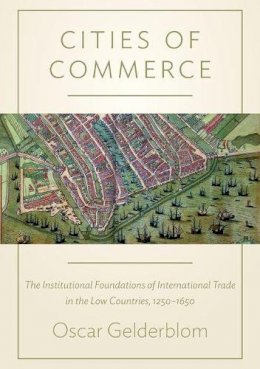
Stock image for illustration purposes only - book cover, edition or condition may vary.
Cities of Commerce: The Institutional Foundations of International Trade in the Low Countries, 1250-1650
Oscar Gelderblom
€ 66.20
FREE Delivery in Ireland
Description for Cities of Commerce: The Institutional Foundations of International Trade in the Low Countries, 1250-1650
Hardback. Develops a model of institutional change in European commerce based on urban rivalry. This book traces the successive rise of Bruges, Antwerp, and Amsterdam to commercial primacy between 1250 and 1650, showing how dominant cities feared being displaced by challengers while lesser cities sought to keep up by cultivating policies favorable to trade. Series: The Princeton Economic History of the Western World. Num Pages: 312 pages, 13 line illus. 10 tables. BIC Classification: 1DDN; 3H; 3JB; KCZ. Category: (P) Professional & Vocational; (U) Tertiary Education (US: College). Dimension: 164 x 241 x 24. Weight in Grams: 578.
Cities of Commerce develops a model of institutional change in European commerce based on urban rivalry. Cities continuously competed with each other by adapting commercial, legal, and financial institutions to the evolving needs of merchants. Oscar Gelderblom traces the successive rise of Bruges, Antwerp, and Amsterdam to commercial primacy between 1250 and 1650, showing how dominant cities feared being displaced by challengers while lesser cities sought to keep up by cultivating policies favorable to trade. He argues that it was this competitive urban network that promoted open-access institutions in the Low Countries, and emphasizes the central role played by the urban power holders--the magistrates--in fostering these inclusive institutional arrangements. Gelderblom describes how the city fathers resisted the predatory or reckless actions of their territorial rulers, and how their nonrestrictive approach to commercial life succeeded in attracting merchants from all over Europe. Cities of Commerce intervenes in an important debate on the growth of trade in Europe before the Industrial Revolution. Challenging influential theories that attribute this commercial expansion to the political strength of merchants, this book demonstrates how urban rivalry fostered the creation of open-access institutions in international trade.
Product Details
Publisher
Princeton University Press
Number of pages
312
Format
Hardback
Publication date
2013
Condition
New
Number of Pages
312
Place of Publication
New Jersey, United States
ISBN
9780691142883
SKU
V9780691142883
Shipping Time
Usually ships in 7 to 11 working days
Ref
99-1
About Oscar Gelderblom
Oscar Gelderblom is associate professor of economic history at Utrecht University. He is the editor of The Political Economy of the Dutch Republic.
Reviews for Cities of Commerce: The Institutional Foundations of International Trade in the Low Countries, 1250-1650
"[A] rich, nuanced, and convincing account of how adaptively efficient commercial institutions emerged from interactions between merchants and city officials in early modern Europe."
Choice "In this fine book, we get a real sense of the riskiness associated with trade ... And of the efforts urban authorities made to cope with risk."
Paul M Hohenberg, EH.Net "Gelderblom's Cities of Commerce, a work informed by both history and economic theory, should evoke both discussion and further work about the origins of the Western European economy."
James M. Murray, Journal of Interdisciplinary History "What the book does in an exemplary and quite fruitful fashion is to sketch the commercial history of three of Europe's most important entrepots, analyzing the changing patterns of trade and institutional drift, assuming some sort of functional relationship between the two... The book will be a welcome addition to recent debates in growth and development studies."
Journal of Economic Literature "Gelderblom's study is a thought-provoking read and a well-modulated, original voice in the debate on the economic, urban and institutional development of pre-modern Europe."
Justyna Wubs-Mrozewicz, English Historical Review "Gelderblom offers a convincing argument in this well-written book."
Donald ]. Harreld, The Historian
Choice "In this fine book, we get a real sense of the riskiness associated with trade ... And of the efforts urban authorities made to cope with risk."
Paul M Hohenberg, EH.Net "Gelderblom's Cities of Commerce, a work informed by both history and economic theory, should evoke both discussion and further work about the origins of the Western European economy."
James M. Murray, Journal of Interdisciplinary History "What the book does in an exemplary and quite fruitful fashion is to sketch the commercial history of three of Europe's most important entrepots, analyzing the changing patterns of trade and institutional drift, assuming some sort of functional relationship between the two... The book will be a welcome addition to recent debates in growth and development studies."
Journal of Economic Literature "Gelderblom's study is a thought-provoking read and a well-modulated, original voice in the debate on the economic, urban and institutional development of pre-modern Europe."
Justyna Wubs-Mrozewicz, English Historical Review "Gelderblom offers a convincing argument in this well-written book."
Donald ]. Harreld, The Historian
